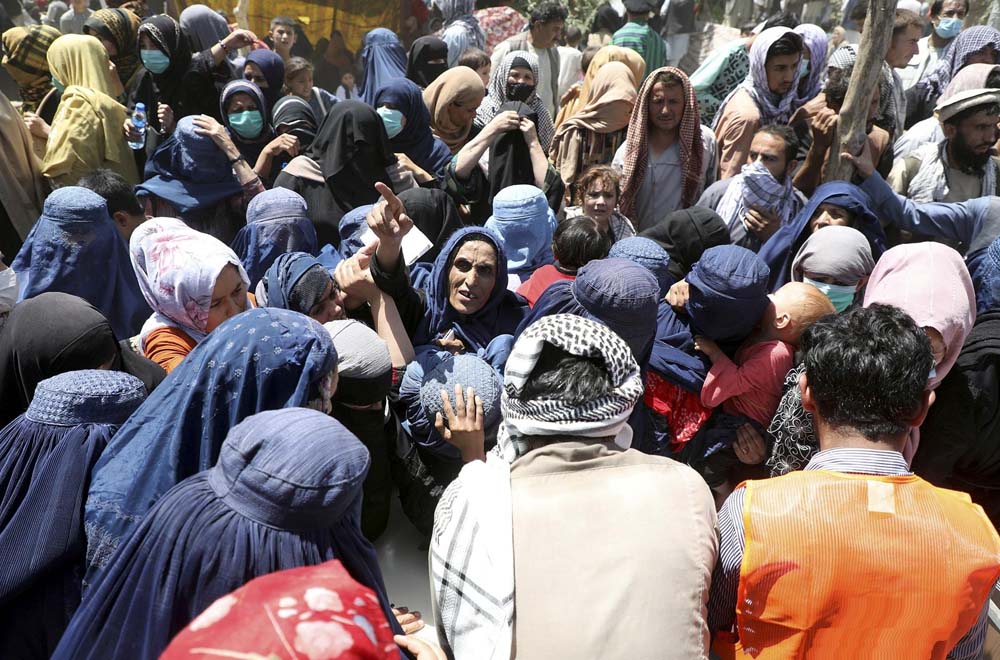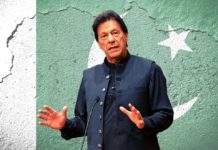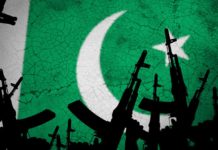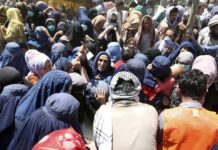Disclaimer: The Eqbal Ahmad Centre for Public Education (EACPE) encourages critical and independent thinking and believes in a free expression of one’s opinion. However, the views expressed in contributed articles are solely those of their respective authors and do not necessarily reflect the position or policy of the EACPE.
The political history of the Afghan nation is fraught with instability aggravated by uncalled for wars, lawlessness followed by long periods of political turmoil. When a nation goes through such episodes of socio-political uncertainties, it’s the people that suffer the most and pay a heavy price in order to atone for the sins committed by the deities of the time.
Violence, displacement, drought and the COVID-19 has gravely affected the Afghan population in the recent years, and the humanitarian disaster gathered pace in May 2021 as the final withdrawal of U.S. and allied forces took place. Desperate Afghans swarmed across borders seeking refuge after the government collapsed on 15 August.
The international community following the guidelines of the New World has decided to cut ties with Afghanistan and has suspended the grant of aid and other socio-economic reliefs to Afghanistan as it finds it hard to accept the Taliban government as legitimate custodian of the Afghan nation. This horrendous step taken by the top brass of major nations is likely to worsen already dilapidated state of the Afghan people.
The recent Integrated Food Security Phase Classification (IPC) report co-led by the Food and Agriculture Organization (FAO) and World Food Programme (WFP), revealed that the lives, livelihoods and access to food for 22.8 million people will be severely impacted.
And globally, the country is home to one of the largest number of people facing acute hunger.
“Hunger is rising and children are dying”, said WFP Executive Director David Beasley. “We can’t feed people on promises – funding commitments must turn into hard cash, and the international community must come together to address this crisis, which is fast spinning out of control”.
The whole debate boils down to the question: Will the global community continue to sit back and witness the unravelling of one of the worst humanitarian crises in the history of mankind, a situation that can create serious social, political issues for the entire international community?
The impact of aid cutoff freezing of foreign exchange reserves, the break of connectivity with domestic and international markets will be felt severely by the country’s burgeoning population including both the urban and marginalized strata of the society particularly women and girls already prone to the Taliban’s actions against them.
“Afghanistan is now among the world’s worst humanitarian crises – if not the worst – and food security has all but collapsed”, said the WFP chief. “This winter, millions of Afghans will be forced to choose between migration and starvation unless we can step up our life-saving assistance, and unless the economy can be resuscitated”
The whole debate boils down to the question: Will the global community continue to sit back and witness the unravelling of one of the worst humanitarian crises in the history of mankind, a situation that can create serious social, political issues for the entire international community?
Given the geo-political importance of Afghanistan in the political paradigm, the international community needs to step up and provide immediate social and economic relief to Afghanistan.
“To abandon the Afghan people now would be a historic mistake — a mistake that has been made before with tragic consequences,” said Deborah Lyons, the Secretary-General’s Special Representative and Head of the United Nations Assistance Mission in Afghanistan (UNAMA).
The Human Rights Watch argued that in light of the looming humanitarian crisis, the shortfalls in food, education and health cannot be met without creating “a plan to address assistance directly involving the Taliban.” This would require not only opening up thinking about the type of assistance that is crucial, but also relaxing some of the sanctions and redline conditions that have been placed on the Taliban government.
Although a full relaxation of diplomatic and financial bars may be too indigestible to accept, donors might simply decide to do what was necessary to get Afghanistan through the winter and allow for a temporary relaxation of funding freezes and sanctions.
To address human insecurity in Afghanistan, the international community should develop a policy of engagement with human security-led goals, recognizing the context and culture in Afghanistan. Policies and approaches related to assistance should be people-focused, not state-focused. Humanitarian assistance needs to address food and health insecurity, and utilize humanitarian NGOs with outreach to rural areas. These programs should provide basic services related to health, food, and shelter for internally displaced populations and those in dire need of assistance.
A contributed article by Sunbal Nawaz Lashari









